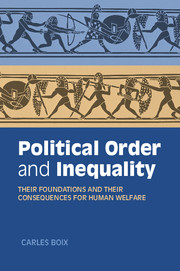5 - Inequality
Published online by Cambridge University Press: 05 March 2015
Summary
Jaume I ... era major que altre hom un palm, e era ben format, ... havia grans espatlles, e llong cors e delgat, e·ls braços grossos e ben feits, e belles mans e llongs dits, e les cuixes grosses per llur mesura, e los peus llongs e ben feits, e gint calçants. (Crònica de Bernat Desclot, late thirteenth century)
Chapter 2 described how the process of technological innovation and the corresponding emergence of a resource gradient interacted with the construction of political institutions to transform prestate societies, which had no formal political institutions and relatively equal distributions of income and wealth, into human communities defined by individual and territorial inequalities.
Those inequalities took place through two channels. The first channel was strictly economic. Output across economic agents and groups diverged when either the rate of innovation varied across individuals or when the level of technological know-how was the same for everyone but its productive application to the assets in the hands of each individual led to different output levels. For example, the invention of large boats and fishing equipment such as weirs and nets could only be exploited along a river or a maritime coast such as the Northwest Pacific Coast. Indeed, so-called complex foraging (i.e., mainly riverine and maritime) societies enjoy higher productivity rates than simple foragers, show some stickiness in the intergenerational transmission of wealth, and are characterized by some social stratification. The domestication of plants and animals that began around 9000 BC produced even sharper patterns of territorial differentiation, economic specialization, and social stratification across the globe.
- Type
- Chapter
- Information
- Political Order and InequalityTheir Foundations and their Consequences for Human Welfare, pp. 171 - 201Publisher: Cambridge University PressPrint publication year: 2015



